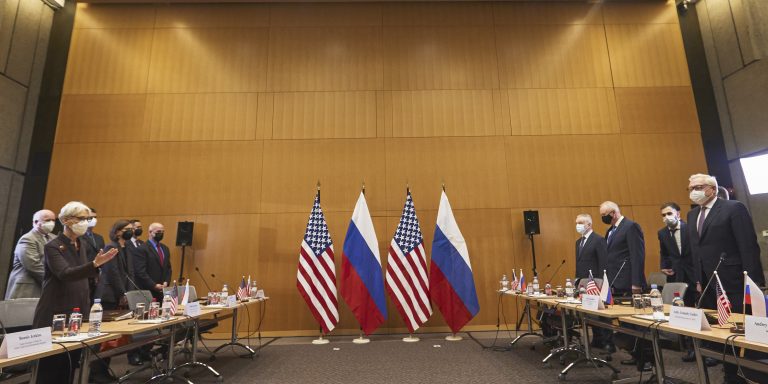INTELBRIEF
January 12, 2022
IntelBrief: U.S. and Russia Meet as Moscow Plans its Next Move

Bottom Line Up Front
- American and Russian diplomats met in Geneva earlier this week, with numerous items on the agenda—a high-profile showcase of diplomacy designed to head off further escalation between Washington and Moscow.
- Russia has continued its saber rattling, making bellicose statements even while negotiations continue apace.
- The Kremlin’s increasingly aggressive posture in Europe has garnered pushback, particularly among Nordic countries and the Baltic states, which fear Russian encroachment.
- While few expect major breakthroughs during this week’s talks, there is hope that the U.S. and Russia might agree upon more limited confidence building measures and continue to favor diplomacy over military actions.
American and Russian diplomats met in Geneva earlier this week, with numerous items on the agenda—a high-profile showcase of diplomacy designed to head off further escalation between Washington and Moscow. Russian Deputy Foreign Minister Sergei Ryabkov downplayed threats of an invasion of Ukraine, while U.S. Deputy Secretary of State Wendy Sherman, the top U.S. diplomat, dismissed several Russian initiatives as “non-starters.” These included demands that the United States end its security cooperation activities with Ukraine and assurances that Kiev would never be admitted into NATO. While some have been critical that Ukraine has been sidelined during the talks, Sherman made it a point to reiterate that Washington “will not make decisions about Ukraine without Ukraine,” an important reaffirmation intended to inspire confidence in the Biden administration’s approach. U.S. President Joseph Biden and Russian leader Vladimir Putin met last summer in Geneva in an attempt to deescalate growing tensions. The latest round of talks seeks to build on some of the issues discussed over last summer.
Part of the discussion focused on reviving the Intermediate-Range Nuclear Forces Treaty, an agreement the U.S. pulled out of in 2019 after accusing Russia of operating outside the parameters of the treaty. Other conversations touched upon reciprocal restrictions on military exercises and missile deployments in Europe. Talks are scheduled to continue this week in Brussels and Vienna, respectively, with NATO and the Organization for Security and Cooperation in Europe (OSCE). Russia has continued its saber rattling, making bellicose statements even while negotiations continue apace. Ryabkov called upon the United States to “show flexibility” and followed up by saying, “If they’re not capable of doing that, then they will collide with a worsening situation in the sphere of their own security.” If Russia does invade Ukraine, as many fear, the Biden administration has promised to slap sanctions on a range of Russian industries, including targeted sanctions aimed at denying Moscow access to critical technologies, including microchips and semiconductors. Other measures would target Russia’s ability to maneuver within the international financial system. In turn, Russia would likely retaliate by leveraging its vast energy reserves to hurt Western countries.
Sweden’s Defense Minister Peter Hultqvist publicly vowed to strengthen Stockholm’s ties with NATO, a trend that has been materializing for the past several years. Finland has also spoken out about NATO, making it clear that Helsinki retains decision-making power as to whether or not it joins the alliance, and that Finland refuses to be “blackmailed” by Russian coercion and threats. The Kremlin’s increasingly aggressive posture in Europe has garnered pushback, particularly among Nordic countries and the Baltic states, which fear Russian encroachment. In a clear acknowledgment of Russia’s continued meddling, Sweden recently established the Swedish Psychological Defense Agency. The agency’s mandate is to “identify, analyze and respond to the impact of undue information influence and other misleading information,” while also working “to develop and strengthen society’s overall capacity for psychological defense.” Scandinavian countries have long lived with trepidation of their eastern neighbor, but because of this long history, especially during the Cold War, they are also well-positioned to counter Russia’s foreign policy playbook.
While few expect major breakthroughs during this week’s talks, there is hope that the U.S. and Russia might be able to agree upon more limited confidence building measures and continue to favor diplomacy over military actions. Russia currently maintains as many as 100,000 troops on Ukraine’s borders. The Biden administration has suggested that, in response to a Russian invasion of Ukraine, it would ramp up military assistance to Ukraine and make Moscow’s foray costly, warning of a quagmire that would drag on indefinitely while attenuating Russia’s military. For his part, Putin has been relentless in his criticism of NATO, complaining about what he sees as interference in Russia’s traditional sphere of influence. Still, if Russia's goal is to keep the NATO alliance at arm's length, invading Ukraine is likely to have the opposite effect. The high-stakes brinksmanship has Ukraine and other countries in the region on edge, yet with the Biden administration explicitly focused on great power competition, Washington intends to signal to Moscow that it is no longer distracted by the insurgencies in Iraq, Afghanistan, and other parts of the world and is prepared to meet Putin’s aggressionhead on.